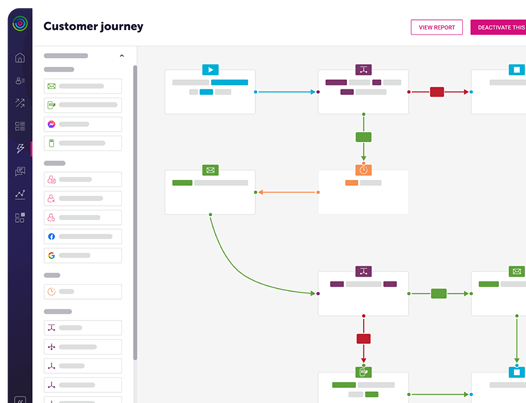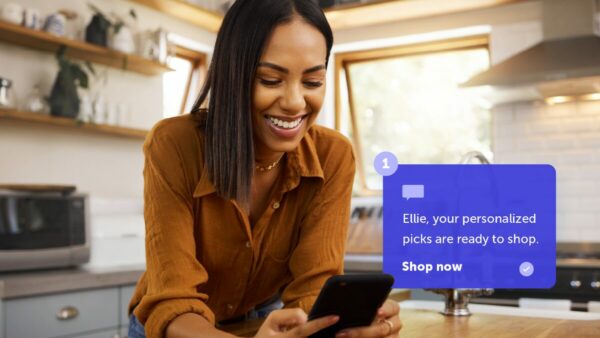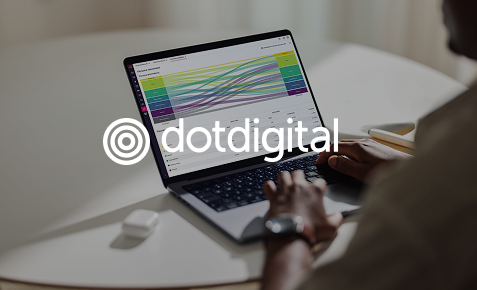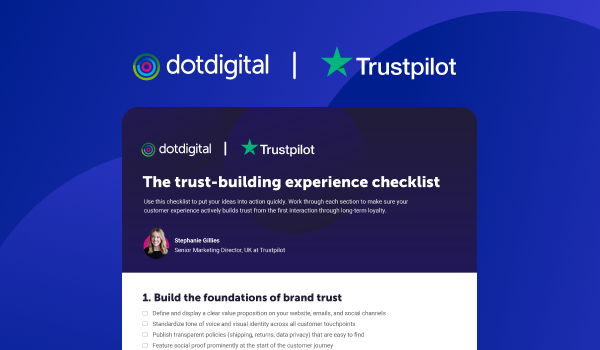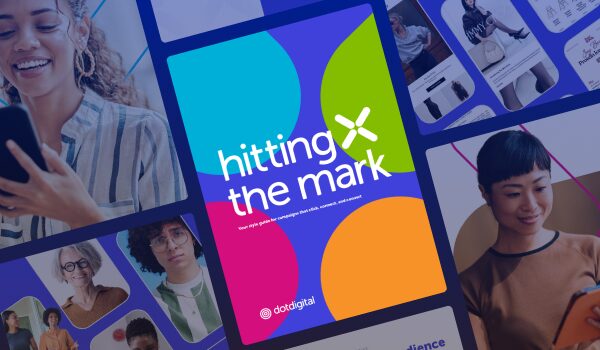Ecommerce personalization that helps marketers deliver smarter, cross-channel experiences
Turn browsing behavior into personalized emails, SMS, web experiences, and product recommendations for B2C and B2B brands in retail and travel, all in one platform.
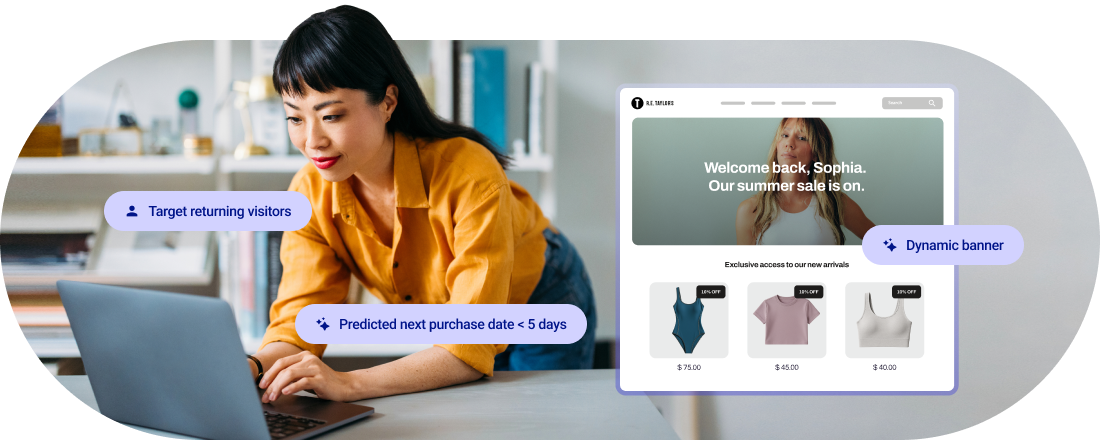
An all-in-one personalization
platform for marketers
-
Captivate shoppers with personalized content
Use dynamic banners to highlight products, offers, and promotions tailored to each visitor’s behavior and preferences.
Boost product discovery and salesShowing shoppers product recommendations matched to their preferences, browsing behavior, and stock availability.
Drive urgency
at checkoutUse real-time countdown timers for limited-time offers, sales, or product launches to encourage faster purchases.
Incentivize purchases
and loyaltyDeliver personalized coupons to attract new customers, reward repeat buyers, and clear excess stock.
-
Cross-channel personalization
Wow your customers with tailored cross-channel experiences
Deliver consistent, relevant experiences across web, email and mobile to increase engagement and sales. Personalize banners, copy, products, offers and imagery by preference, behavior, and events, using demographic and geographic data.
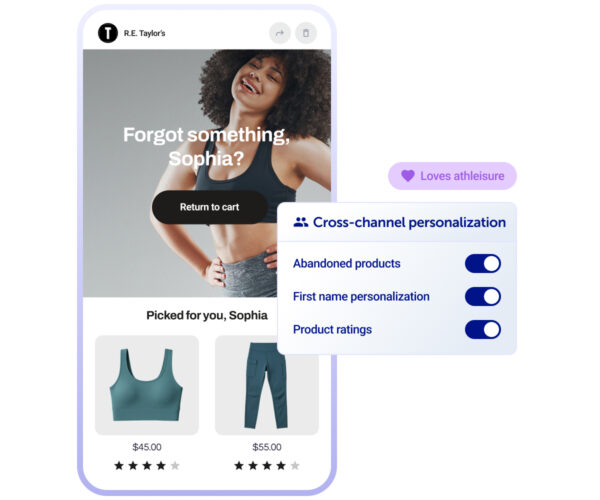
-
Triggered email & SMS
Convert more with timely triggers
Automate personalized messages based on customer behavior. Turn window shoppers into buyers with abandoned cart, price drop and back-in-stock alerts. Increase AOV with post-purchase triggers and loyalty journeys.
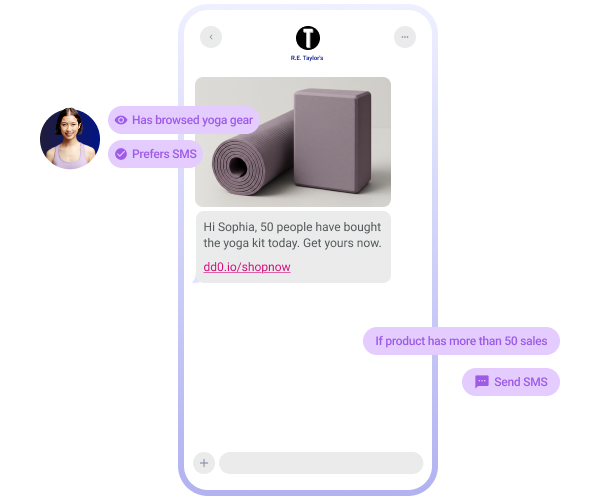
-
AI-powered recommendations
Boost sales with 40+ recommendation types
WinstonAI identifies and displays the most compelling product recommendations for email and web using real-time customer preferences, product catalog data, buying and browsing history.
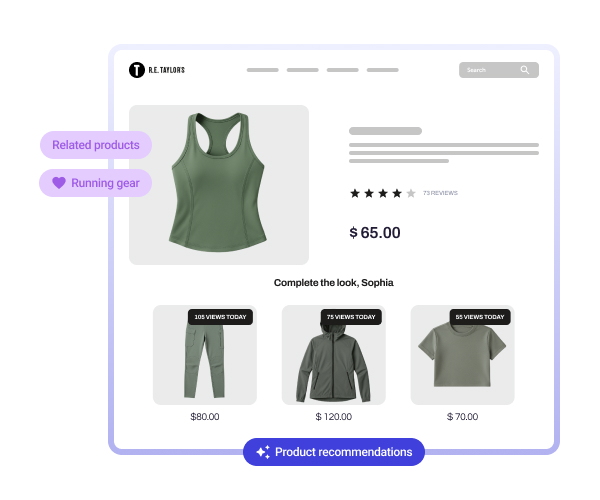
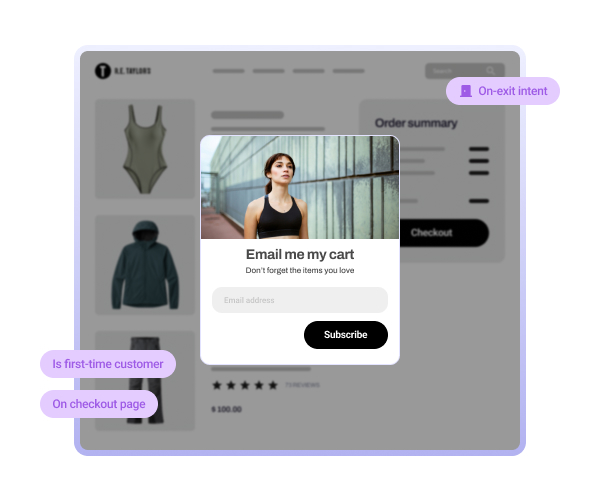
Grow your database and convert every website visitor
Easily create popovers that match your branding – no coding required. Trigger popovers and tailor content based on time, behavior, preferences, context and more.
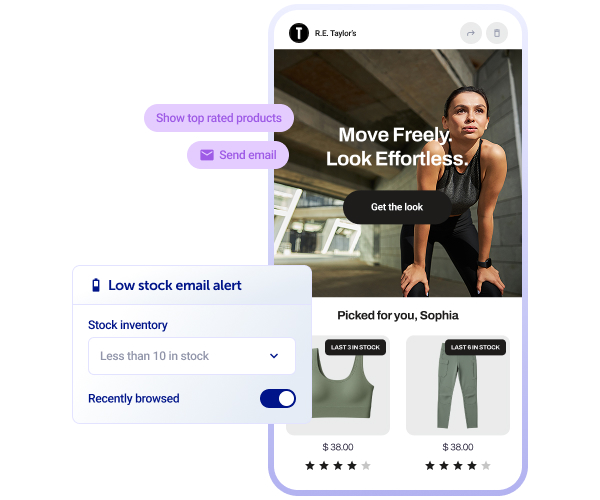
Create urgency with social proof
Nudge your customers towards quick decisions with popularity and scarcity messaging. Build trust through ratings and reviews, easing purchase anxiety. Turn your content into commerce with live social feeds.
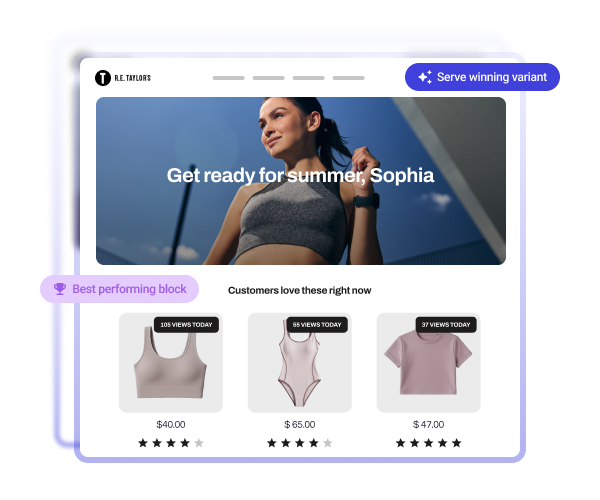
Automatically deploy the best performing content
Say goodbye to guesswork. WinstonAI tests, identifies and deploys your best performing web content. Optimize tactics for goals like increasing AOV, conversion or ID rate.
Personalize every channel with one platform
-

Delight web visitors with dynamic data-capture popups to get new sign-ups, personalized banners to welcome back customers and product recommendations to increase sales.

Drag-and-drop your way to record open rates with personalized email programs that welcome, nurture, remind, recommend and reengage your customers.

Make your app undeletable by creating 1-1 style experiences using cross-channel tactics and first-party data.

Retarget high-intent audiences on Meta, Google, X and TikTok and convert ad traffic with landing page personalization.

Keep customers updated with automated and dependable SMS marketing that has built-in link tracking and shortening.

Use WhatsApp to create personal, two-way conversations with rich media, tailored product recommendations and real-time support.
Frequently asked questions
Why is ecommerce personalization important?
Personalization is important as it you connect with your customers on a deeper level. When you provide a tailored experience, shoppers feel recognized and appreciated, which builds trust and loyalty. Customized shopping journeys not only reduces friction in your customer’s journey but also boost repeat purchases and enhance customer lifetime value.
Who benefits most from personalization?
Ecommerce brands of all sizes can benefit from personalization, but it’s especially useful for:
- Online retailers looking to increase conversions and average order value
- Cross-channel marketing teams wanting to deliver consistent experiences across web, email, SMS, and mobile
- Growth-focused businesses aiming to retain customers and drive repeat purchases
Which parts of the ecommerce journey can be personalized?
Personalization can be applied across the entire customer journey, including:
- Browsing: Display relevant products and content based on what a shopper views
- Checkout: Offer personalized product recommendations and incentives to increase conversions
- Post-purchase: Send follow-up emails or SMS with product suggestions, loyalty rewards, or replenishment reminders
- Retention: Encourage repeat purchases with behavior-driven campaigns and tailored promotions
What are the benefits of ecommerce personalization and what results can I expect?
A strong ecommerce personalization strategy helps you connect with shoppers on a deeper level and drives measurable business results. By tailoring content, offers, and recommendations to each customer, you can:
- Increase engagement: Personalized content captures attention and keeps customers interacting with your site, email, and mobile channels
- Boost conversions: Recommendations, personalized promotions, and incentives encourage shoppers to complete purchases
- Drive higher average order value (AOV): Suggesting complementary products or upsells encourages larger baskets
- Improve retention and loyalty: Customers are more likely to return when experiences feel relevant and meaningful
- Enhance customer satisfaction: Personalized journeys make shoppers feel recognized and appreciated, creating trust
- Maximize ROI: By improving engagement, conversion, and retention, you get a higher return on your marketing efforts
How do dynamic product recommendations work?
Dynamic product recommendations use real-time data, such as browsing activity and purchase history, to suggest products that align with each customer’s preferences and behaviour.
For example, customers may see items similar to those they’ve previously viewed or complementary products based on their shopping cart. This level of personalization enhances relevance and drives sales by presenting items that customers are more likely to purchase.
How does Dotdigital help my personalization strategy?
Dotdigital offers a range of tools and features to power your ecommerce personalization, including:
- AI-driven recommendations: Algorithms analyze customer data to present the most relevant products or offers.
- Behavioural targeting: Tracks customer behaviour to trigger personalized responses, such as abandoned cart emails or tailored promotions.
- Countdown timers: Creates urgency by showing time-limited offers, encouraging shoppers to take action quickly.
- Customizable banners: Adapts messaging to reflect customer preferences, improving engagement across different touchpoints.
Can I personalize across web, email, SMS, and mobile?
Yes. Dotdigital allows you to deliver personalized experiences across all major channels, ensuring your message is consistent wherever your customers engage. This includes:
- Personalized website banners and product recommendations
- Targeted emails and automated follow-ups
- SMS campaigns tailored to customer behavior
- Mobile push notifications based on browsing and purchase activity
How easy is it to set up personalized campaigns?
Dotdigital makes personalization simple for marketers of all skill levels:
- Pre-built templates for banners, emails, and SMS campaigns
- Drag-and-drop editors for creating dynamic content
- AI-powered recommendations automatically tailored to each customer
- Step-by-step workflows to trigger campaigns based on behavior, cart activity, or preferences
How can businesses measure the success of personalization efforts?
The effectiveness of ecommerce personalization can be tracked using key performance indicators (KPIs), such as:
- Conversion rates: Measure how many customers complete desired actions, such as purchases.
- Customer retention: Track repeat purchases to determine how effectively personalization drives loyalty.
- Average order value (AOV): Assess whether personalized recommendations and upselling strategies increase transaction sizes.
- Engagement metrics: Analyze click-through rates and time spent on pages to evaluate content effectiveness.

